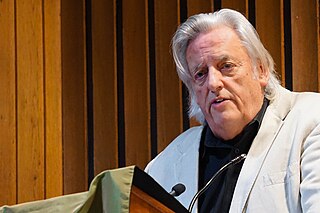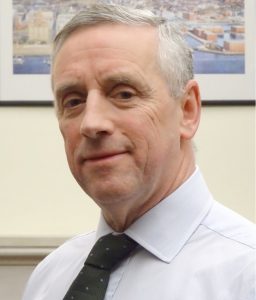Related Research Articles
The presumption of innocence is a legal principle that every person accused of any crime is considered innocent until proven guilty. Under the presumption of innocence, the legal burden of proof is thus on the prosecution, which must present compelling evidence to the trier of fact. If the prosecution does not prove the charges true, then the person is acquitted of the charges. The prosecution must in most cases prove that the accused is guilty beyond a reasonable doubt. If reasonable doubt remains, the accused must be acquitted. The opposite system is a presumption of guilt.

Michael Mansfield is an English barrister and head of chambers at Nexus Chambers. He was recently described as "The king of human rights work" by The Legal 500 and as a leading Silk in civil liberties and human rights.
Not proven is a verdict available to a court of law in Scotland. Under Scots law, a criminal trial may end in one of three verdicts, one of conviction ("guilty") and two of acquittal.

Geoffrey Ronald Robertson is an Australian-British barrister, academic, author and broadcaster. Robertson is a founder and joint head of Doughty Street Chambers. He serves as a Master of the Bench at the Middle Temple, a recorder, and visiting professor at Queen Mary University of London.

The Criminal Cases Review Commission (CCRC) is the statutory body responsible for investigating alleged miscarriages of justice in England, Wales, and Northern Ireland. It was established by Section 8 of the Criminal Appeal Act 1995 and began work on 31 March 1997. The commission is the only body in its area of jurisdiction with the power to send a case back to an appeals court if it concludes that there is a real possibility that the court will overturn a conviction or reduce a sentence. Since starting work in 1997, it has on average referred 33 cases a year for appeal.
A law centre is a specific type of not-for-profit legal practice in the United Kingdom which provides legal aid to people otherwise not able to access commercial legal support. Law centres are independent and directly accountable to the communities they serve, usually through committees of local community members. The Law Centres Network (LCN) represents law centres in all levels of government.

Doughty Street Chambers is a British set of barristers' chambers situated in Bristol, Manchester and London's Doughty Street, undertaking criminal justice, public law, immigration, employment, human rights and civil liberties work.
Anthony Maurice Gifford, 6th Baron Gifford, KC, is a British hereditary peer and King's Counsel. He inherited the title of Baron Gifford on the death of his father, the 5th Baron, in April 1961. In 1970, Gifford was instrumental in establishing the first law centre in the UK.

In England and Wales, squatting – taking possession of land or an empty house the squatter does not own – is a criminal or civil offence, depending on circumstances. People squat for a variety of reasons which include needing a home, protest, poverty, and recreation. Many squats are residential; some are also opened as social centres. Land may be occupied by New Age travellers or treesitters.

Sir Rabinder Singh, PC, styled The Rt. Hon. Lord Justice Singh, is a British Court of Appeal judge and President of the Investigatory Powers Tribunal, formerly a High Court judge of the Queen's Bench Division, a King's Counsel and barrister, formerly a founding member of Matrix Chambers and a legal academic.
Edward Hamilton Fitzgerald is a British barrister who specialises in criminal law, public law, and international human rights law. His work against the death penalty has led him to represent criminals such as: Myra Hindley, Mary Bell, Maxine Carr, various IRA prisoners, and Abu Hamza. Fitzgerald is currently the joint head of Doughty Street Chambers.

Sir Timothy Victor Holroyde, PC, styled The Rt. Hon. Lord Justice Holroyde, is an English Court of Appeal judge, formerly a judge of the High Court of Justice of England and Wales, Queen's Bench Division. He was appointed to the Court of Appeal in October 2017. He was sworn of the Privy Council in 2017. In 2015 he was appointed a member of the Sentencing Council for England and Wales, and served as its Chairman between 2018 and 2022. In June 2022 he was appointed Vice-President of the Court of Appeal, succeeding Lord Justice Fulford.

Martha Spurrier is a British barrister and human rights campaigner. She was the director of the advocacy group Liberty from 2016 to 2024.

Deborah Anne, Lady Chambers is a New Zealand King's Counsel specialising in relationship property and trusts law. She was married to the New Zealand Supreme Court judge, Sir Robert Chambers from 2004 until his death in 2013.
A presumption of guilt is any presumption within the criminal justice system that a person is guilty of a crime, for example a presumption that a suspect is guilty unless or until proven to be innocent. Such a presumption may legitimately arise from a rule of law or a procedural rule of the court or other adjudicating body which determines how the facts in the case are to be proved, and may be either rebuttable or irrebuttable. An irrebuttable presumption of fact may not be challenged by the defense, and the presumed fact is taken as having been proved. A rebuttable presumption shifts the burden of proof onto the defense, who must collect and present evidence to prove the suspect's innocence, in order to obtain acquittal.

The Secret Barrister:Stories of the Law and How It's Broken is a 2018 book by an anonymous author with the pen name "The Secret Barrister". It is a critical first-hand account of the state of the criminal justice system in England and Wales. The subtitle is a play on words: the book is not about criminal lawbreaking, but about how the legal system is failing in its purpose.
Jacqueline Margarete Jones is a Welsh politician, barrister, and academic. She served as the Labour Party Member of the European Parliament (MEP) for Wales from 2019 to 2020. She taught law at Cardiff Law School, Cardiff University, and then at Bristol Law School, University of the West of England, where she was Professor of Feminist Legal Studies.
Patrick John Harrington KC is a Welsh criminal law barrister and King's Counsel. He has acted in more than 250 homicide trials, and has been noted for work on some of "the largest and most complex fraud cases in the UK". He has been referred to as one of Wales' "most prominent" lawyers.

On 14 March 2022, the Criminal Bar Association (CBA) in England and Wales voted to undertake industrial action protesting against stagnant fees with 94% of criminal barristers in favour. The industrial action consisted of refusal to accept returns—substitution of a new barrister, often at the last minute, when another of them is unavailable to make a trial date—in Advocates' Graduated Fee Scheme (AGFS) -funded cases in the Crown Court. The action began on 11 April 2022. Almost 2,500 people are participating in the action. The CBA did not consider the initial action a strike because its members are under no obligation to accept returns, which it calls "a gesture of goodwill to prop up the criminal justice system". Two months later, in June 2022, barristers began an open-ended strike every other week based on a CBA ballot in late May. In October 2022, during the premiership of Liz Truss, barristers voted to end the strike following a deal with then-Secretary of State for Justice, Brandon Lewis.
Anna Maria Grear is an English academic, author, and political activist. Grear is the founder of several academic and activist organisations, including the Global Network for the Study of Human Rights and the Environment (GNHRE) and the Journal of Human Rights and the Environment, where she is editor-in-chief. Grear is adjunct professor of law at the University of Waikato and was professor of law and theory at Cardiff University until 2023. She has written for such international newspapers as The Wire and Süddeutsche Zeitung. She is also the owner of HypnoCatalyst, an organisation specialising in integrative psychotherapy.
References
- ↑ "Jon Robins". University of Brighton. Retrieved 6 January 2024.
- ↑ "The justice gap: whatever happened to legal aid?". Legal Action Group. 22 April 2009. Retrieved 6 January 2024.
- ↑ "Guilty Until Proven Innocent: The Crisis in Our Justice System". Biteback Publishing.
- ↑ "Justice in a Time of Austerity: Stories From a System in Crisis". Bristol University Press.
- ↑ "Jon Robins". The Conversation . 28 September 2022. Retrieved 6 January 2024.
- ↑ "About us". The Justice Gap. Retrieved 6 January 2024.
- ↑ "Hold the front page! Students write for leading online voice for law and justice". Cardiff University. 9 January 2023. Retrieved 7 January 2024.
- 1 2 3 "The Justice Gap". University College London. 7 September 2023. Retrieved 6 January 2024.
- ↑ "Shop". The Justice Gap. Retrieved 6 January 2024.
- ↑ Davies, Liz (20 July 2017). "Proof magazine #3: 'Life in the Justice Gap: Why legal aid matters' launch supported by Garden Court Chambers". Garden Court Chambers. Retrieved 7 January 2024.